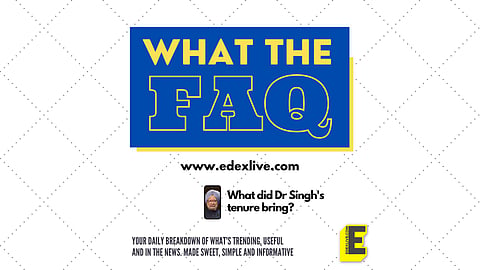

The former Prime Minister of India Dr Manmohan Singh (PhD Doctorate in Economics) is celebrating his 90th birthday today, September 26. The third longest serving Prime Minister in India, who served for two consecutive years from 2004 to 2009 and from 2009 to 2014, has contributed a lot to this country as the Prime Minister and an active member of the Indian National Congress (INC) while holding a number of prominent positions.
On his birthday, let us catch up on some important facts and milestones of Dr Singh's life.
Who is Dr Manmohan Singh?
Born in the year 1932, Gah, West Punjab, India which is now part of Pakistan, Dr Manmohan Singh is an Indian economist and politician. He attended the University of Punjab where he graduated with a Bachelors's and Masters's degree in Economics. Later, he moved to Cambridge University to pursue his higher studies in Economics and received his Doctorate in the same subject from Oxford University, England. He then worked at the Reserve Bank of India (RBI) where he served as the Director and was appointed as the Governor of RBI under the then Finance Miniter Pranab Mukherjee.
Dr Singh also held an advisory position to the former Primer Minister Chandra Shekhar Singh Solanki. He was the first Sikh Prime Minister of India.
What are his major achievements?
Dr Manmohan Singh was named the Finance Minster of the country, although he had no connection to the then ruling party, the Indian National Congress. He was elected as the Finance Minster by the then Prime Minister PV Narasimha Rao in 1991 during a severe economic crisis India was facing. When the country was on the brink of collapse, Singh brought in measures like devaluing the rupee, lowering taxes, privatising state-run industries and encouraging foreign direct investments that helped transform the country’s economy and spark an economic boom.
During his two terms as the Prime Minister of India, Manmohan Singh brought in various reforms that helped in the development of the country. These reforms were related to economic policy, healthcare, education, anti-terror laws, foreign policies and so on.
What are some of the remarkable moments of his tenure?
In 2005, when the demand for energy was increasing in India, Singh entered into negotiations with the former US President George W Bush for a nuclear cooperation pact. The deal would be for India to receive fuel technology for nuclear plants and the ability to purchase nuclear energy from the world market.
India and the US signed the agreement with the approval of the Nuclear Suppliers Group and the International Automic Energy Agency (IAEA) on October 10, 2008.
In 2006, the Government implemented reserving 27% of seats for Other Backward Classes in All India Institute of Medical Studies (AIIMS) and Indian Institute of Technology (IIT) and in other central institutes for higher education. During his ministry, the Right of Children to Free and Compulsory Education Act, 2009 was implemented.
What did he do after his tenure as the Prime Minister of the country?
After the slowing down of the economic growth in India, and with further allegations on the Congress party of corruption and the 2G scam, Dr Manmohan Singh said that he will not be seeking the position of the Prime Minister of India for the third time and left office on May 26 when Narendra Modi was sworn in as the new Prime Minister of India. He then won the Grand Cordon of the Order of the Paulownia Flowers award presented by the Government of Japan.
